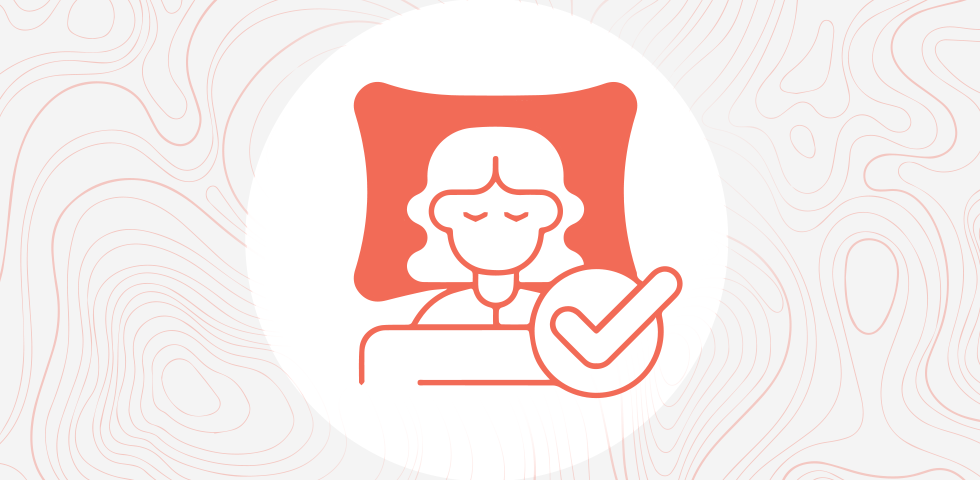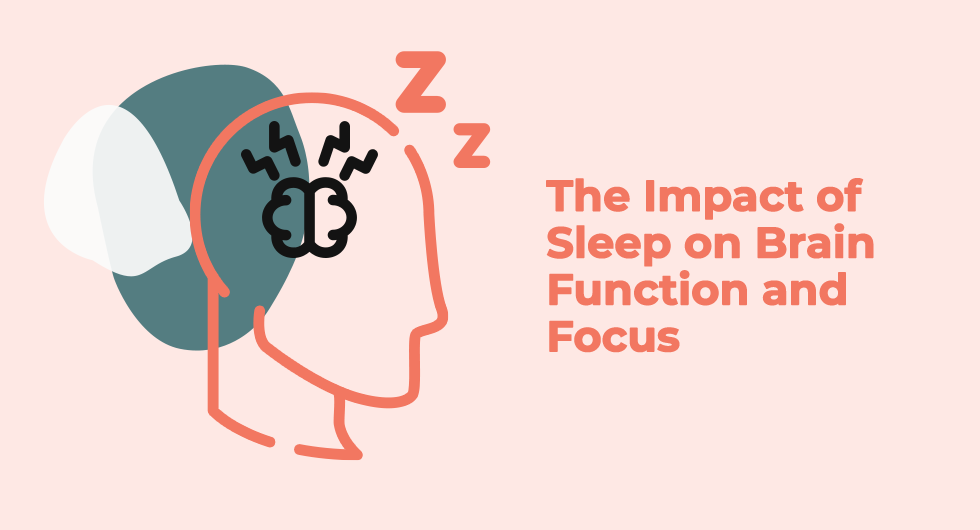Sleep is essential to our daily lives, yet many often underestimate its importance. It’s not just a time for our bodies to rest; sleep is crucial in maintaining optimal brain function and focus.
In this article, we’ll explore how sleep affects mental health, why it’s essential for the brain, how sleep benefits in increasing focus and concentration, and what sleep does for the brain.
Understanding these aspects will highlight the importance of prioritising quality sleep in our daily routines.
How Does Sleep Affect Mental Health?

Sleep and mental health are closely intertwined. Adequate sleep is vital for emotional stability and mental well-being. Here’s how sleep affects mental health:
- Mood Regulation: Sleep helps regulate our mood. Lack of sleep can lead to irritability, stress, and increased susceptibility to anxiety and depression. During sleep, the brain processes emotions, essential for maintaining a balanced mood. REM (Rapid Eye Movement) sleep, in particular, is crucial for processing emotional experiences, helping us to respond appropriately to our waking life challenges.
- Hormone Regulation: Sleep regulates the production of hormones that affect the brain, such as cortisol and melatonin. Balanced hormone levels are essential for mood regulation, stress response, and overall brain function. For instance, melatonin helps regulate the sleep-wake cycle, promoting a regular sleep pattern.
- Learning and Memory: Sleep enhances learning and memory consolidation. During different sleep stages, the brain processes and stores new information, which is crucial for academic and professional success. For example, deep sleep helps consolidate declarative memories (facts and knowledge), while REM sleep aids in procedural memory (skills and tasks).
- Cognitive Functioning: Good sleep enhances cognitive functions such as memory, problem-solving skills, and decision-making. Sleep deprivation can impair these functions, leading to difficulties in concentration, creativity, and overall mental performance. Studies have shown that sleep-deprived individuals perform worse on tasks requiring logical reasoning or complex thought processes.
- Stress Management: Sleep is essential for stress management. When we sleep, our body reduces stress hormones like cortisol, helping us handle stress better when awake. Chronic sleep deprivation can increase stress levels, making it harder to manage daily pressures and contributing to the development of mental health disorders.
- Emotional Resilience: Sufficient sleep helps build emotional resilience. People who sleep well are generally better at coping with emotional challenges and returning from adverse experiences. This resilience is critical for maintaining mental health, especially during significant life changes or stressors.
- Psychiatric Disorders: There is a bidirectional relationship between sleep and psychiatric disorders. Conditions like anxiety, depression, bipolar disorder, and schizophrenia often involve sleep disturbances, and improving sleep can be a crucial part of managing these conditions. For instance, improving sleep quality can significantly improve depressive symptoms.
- Creativity and Innovation: Sleep boosts creativity and innovation. By allowing the brain to rest and rejuvenate, sleep fosters creative thinking and problem-solving abilities, essential for personal and professional growth. Many artists, writers, and scientists have reported that their best ideas come to them after a good night’s sleep.
Therefore, maintaining good sleep hygiene is fundamental for mental health, influencing mood, cognitive functions, and stress levels.
Why Is Sleep Important for the Brain?
After knowing “how sleep affects mental health”, let’s focus on why sleep is critical for the brain’s overall health and functionality. Because we know that brain is the main driver of mental health, and well-being.:
- Neural Plasticity: Sleep is essential for neural plasticity, the brain’s ability to adapt and reorganise. This process is crucial for learning and memory. During sleep, particularly during REM (Rapid Eye Movement) sleep, the brain processes and consolidates information acquired during the day. Without this rest, the synapses stay excited for a longer period which is detrimental to brain functions. The consolidation is vital for learning new skills and retaining information.
- Detoxification: The brain has a unique waste clearance system known as the glymphatic system, which is highly active during sleep. This system removes toxins and metabolic waste products that accumulate during wakefulness, preventing cognitive decline and diseases like Alzheimer’s. Without adequate sleep, these toxins can build up, potentially leading to long-term brain damage.
- Energy Conservation: Sleep helps conserve energy. By reducing metabolic rates, the brain and body can perform essential functions without expending excessive energy. This conservation is crucial for maintaining optimal brain function, allowing us to wake up refreshed and ready to take on daily tasks.
- Memory Consolidation: Sleep plays a pivotal role in consolidating memories. Different stages of sleep, including REM and non-REM sleep, are involved in processing and storing various memories, from procedural tasks to emotional experiences. For example, deep (slow-wave) sleep is important for consolidating factual information and experiences, while REM sleep helps in emotional processing.
- Synaptic Homeostasis: Sleep helps maintain synaptic homeostasis, balancing synaptic strength and plasticity. This balance is vital for learning, memory, and overall cognitive function. Without sleep, synaptic connections can become overloaded, leading to impaired brain function. The synaptic homeostasis theory suggests that sleep helps prune and optimise synaptic connections formed during the day.
Understanding the importance of sleep for the brain underscores the need for prioritising rest as a cornerstone of health. Now let’s know how sleep improves focus in daily life.
How does Sleep help in improving Focus?
Sleep focus refers to the brain’s ability to maintain and improve focus and attention through adequate rest. Here’s how sleep focus works:
- Attention and Concentration: Sufficient sleep enhances attention and concentration. Sleep-deprived individuals often struggle with maintaining focus, leading to decreased productivity and increased likelihood of errors. For example, students who get adequate sleep perform better on tests and assignments that require sustained attention.
- Reaction Times: Sleep improves reaction times and decision-making skills. Well-rested individuals can process information more quickly and respond to situations more effectively. This is crucial for activities requiring quick reflexes and sharp thinking, such as driving or playing sports.
- Executive Functioning: Sleep boosts executive functioning, including planning, organising, and multitasking. These higher-order cognitive processes can suffer without adequate sleep, affecting daily performance and long-term goal achievement. For example, sleep-deprived individuals may struggle to prioritise tasks or manage time efficiently.
- Selective Attention: Sleep helps improve selective attention, focusing on relevant stimuli while ignoring distractions. This is particularly important in environments with multiple sources of information competing for our attention. For instance, a well-rested person can better concentrate on a conversation in a noisy room.
- Error Reduction: Good sleep reduces the likelihood of errors. Inadequate sleep can lead to lapses in attention and judgement, increasing the risk of mistakes in both simple and complex tasks. For example, medical professionals who are sleep-deprived are more likely to make errors in patient care.
By enhancing focus and attention, sleep plays a pivotal role in achieving peak performance in various aspects of life. Let’s figure out the impact of sleep on the brain.
How does the Evolv28 Device Promote Better Sleep?
- Ultra-Low Magnetic Fields: The device emits magnetic fields below 10 milligauss, which are gentle and harmonise with the body’s natural magnetic rhythms. High magnetic fields from other devices can disrupt sleep. Still, the ultra-low magnetic fields of Evolv28 help maintain a natural sleep environment, facilitating easier sleep onset and deeper sleep stages.
- Enhanced Relaxation: The gentle magnetic fields emitted by Evolv28 help to relax the mind and body. This relaxation effect is conducive to sleep as it lowers stress levels and promotes a state of calmness, making it easier for users to transition from wakefulness to sleep.
- Emotional Stability: By harmonising brainwaves, Evolv28 helps stabilise emotions, reducing stress and anxiety. These mental states are significant contributors to sleep disturbances. By promoting emotional stability, the device allows users to achieve a calm state of mind, which is essential for falling asleep and staying asleep throughout the night.
- Targeted Sleep Programs: Evolv28 offers specific programs designed to improve sleep. These programs are tailored to address various aspects of sleep disturbances, such as difficulty falling asleep, frequent awakenings, and maintaining sleep throughout the night. By targeting these specific issues, the device helps users achieve a more restful and uninterrupted sleep.
What’s more Evolv28 offers for Better Sleep?

- Non-Invasive Technology: Evolv28 uses Variable Complex Magnetic Field (VCMF) technology, which does not require invasive procedures or direct physical intervention. This non-invasive approach ensures the device can be used comfortably and safely during sleep without discomfort or risk of adverse side effects. This makes it ideal for long-term, nightly use, aiding in consistent improvement in sleep patterns.
- Long Battery Life: With up to 60 hours of playtime and 10 days of standby, Evolv28 ensures that it can be used consistently throughout the night without requiring frequent recharging. This reliability means users can trust that the device will support their sleep every night, contributing to a stable sleep routine.
- Quiet Operation: The device operates silently, crucial for maintaining a peaceful sleep environment. Noise can be a significant disruptor of sleep, and the quiet operation of Evolv28 ensures that there are no auditory interruptions, allowing users to sleep undisturbed.
Conclusion
It is crucial to know how sleep affects mental health and why sleep is very imporatant for the brain to know the solutions to promote better sleep.
Evolv28 represents a groundbreaking advancement in personal wellness technology, particularly in promoting better sleep. With the added benefit of reducing stress and anxiety, Evolv28 is not just a sleep aid but a comprehensive tool for enhancing overall mental wellness.
Don’t let sleepless nights hold you back any longer. Experience the transformative power of Evolv28 and take the first step towards better sleep and enhanced well-being.
Order today at Evolv28 and join the many who have already discovered the benefits of improved sleep and reduced stress.
